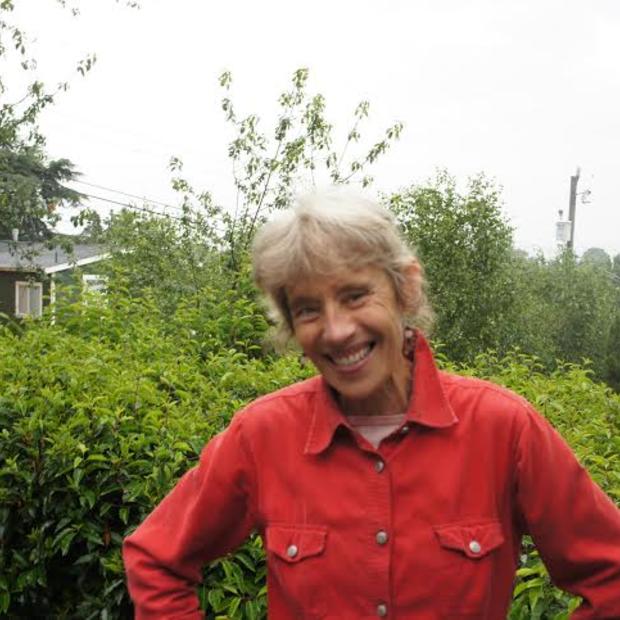Head north on the ‘Woodinville Wine Highway’ past tracts of tasting rooms and wine cellars, navigate the roundabouts and eventually you’ll come to a unique farm and agriculture hub called 21 Acres. In addition to farming the land, the center leases some to local P-Patch organizations, and operates an educational agricultural center and commercial kitchen which farmers can use to store, distribute and process their food. Classes are offered on everything from beekeeping to food preservation and a small market sells produce and packaged farm products.

Photo: 21 Acres
Here, locally-grown produce receives the marketing and distribution attention long-given to grapes by the wine industry. Apples become apple butter, red cabbage a specialty seasoning and red potatoes become what 21 Acres chef Emily Moore calls ‘GBD’ — golden brown and delicious baked Duchess Potatoes. Creating a value-added product even works for an herb like stinging nettle, which Moore just picked on the farm. “Once you blanch them, they no longer sting and they’re very mild and sweet and delicious,” she explains. Add potatoes, leeks, sorrel, cream and milk and voila, tasty nettle soup, for sale at the market.
Click on the player above or here to listen to the audio version of this story.
21 Acres is a non-profit committed to helping local growers succeed. Educating the public about sustainable farm and food practices goes with the territory. The center got its start when the county's Farmland Preservation Program purchased the fertile but swampy piece of land near the Sammamish River. Members of the Woodinville Farmer's Market Association created 21 Acres to organize the purchase the land. In 2005, Gretchen Garth, a member of the Association and 21 Acres' acting Director, used personal money for just that. It wasn't until 2009 that 21 Acres broke ground on the showcase green building.
“Once the land became available, it became a real no-brainer to look at it as a possible place to develop a farmstead along with the kitchen facilities that were going to be necessary to process some of the food that came off the farm,” says Kurt Sahl, a consultant with 21 Acres.
The energy efficient building was designed to meet multiple functions and serve the land. Graywater flows through bio-digesting tanks before being dispersed to the farm. Composting toilets and waterless urinals are expected to reduce water use by 80 percent. A berm or mound of earth extends from the kitchen to cover the water and storm filtration systems and a storage space for produce on its way to market.
“It’s grandma’s root cellar,” explains Brenda Vanderloop, 21 Acres Communications Manager, as she stops to answer questions on a farm tour. "So, for our farmers who need a location to store food long term, it’s temperature controlled and it gives us access for our retail market and of course the food hub is using it as a location for distribution.”

Architect Nancy Henderson estimates the building will save 30 percent in energy costs. A rooftop solar array offsets an estimated 12 percent of the facilities' electric consumption. The windows and skylights have a very high thermal resistance and a ground source heat pump uses the stable temperature of the earth to transfer heat and cool the building. “This project does all of the things we wish our other projects had the capacity to do,” says Henderson, the Managing Partner of ArchEcology. "Many push the envelope, but none of them are stepping outside the box as much as 21 Acres.”
The 21 Acres building was built to last 100 years, but what will happen to the land surrounding it is somewhat uncertain. Across the street, 60,000 square feet of retail and 600 upscale apartments are going in. Last year, several property owners asked the King County Council to redesignate their land from rural to urban.
The move would allow more intensive development, such as hotels and restaurants, to accommodate wine industry tourism. Woodinville Chamber of Commerce Director Dave Witt says Chateau St. Michelle Winery brings in over 300,000 people a year for wine tasting and concerts.
“So there’s a tremendous demand," he explains. "Right now that demand is being satisfied by our surrounding cities. Redmond, Kirkland and Bothell will often put out promotions offering deals for people visiting Woodinville wineries to stay in their hotels. We want them to be able to stay here, closer to where the wineries are.”
Tom Quigley sits on the board of the Woodinville Chamber of Commerce and was a member of the King County Agriculture Commission for ten years. He says there’s plenty of undeveloped land in the area on which to build hotels without going after farmland.
All land zoned agriculture from the south end of the Sammamish Valley to the north is being used, he says. Does Woodinville want to look like the Kent Valley and South Center Shopping Mall? “Prior to King County initiating the Farmland Preservation Program back in the late 1980s, that land was all purchased and paved over," Quigley says. "The ability to grow food there has been totally lost.”
The new boundary was supported by the Woodinville City Council, but King County's Council and Executive Dow Constantine rejected the move. The two bodies have agreed to make joint recommendations for promoting wineries and farming, but talks are on hold until King County hires a new planning director.
Meanwhile residential development continues. A large home just went up right next to a half-acre of 21 Acres property that has been used for farming by a veteran's organization. The land is zoned rural, which means there is one dwelling allowed for every five acre parcel of land. So far, changes to the residential development rules are not on the table for discussion by the county and Woodinville city officials.

